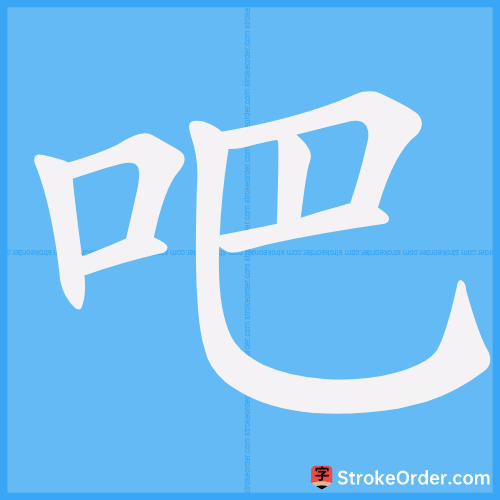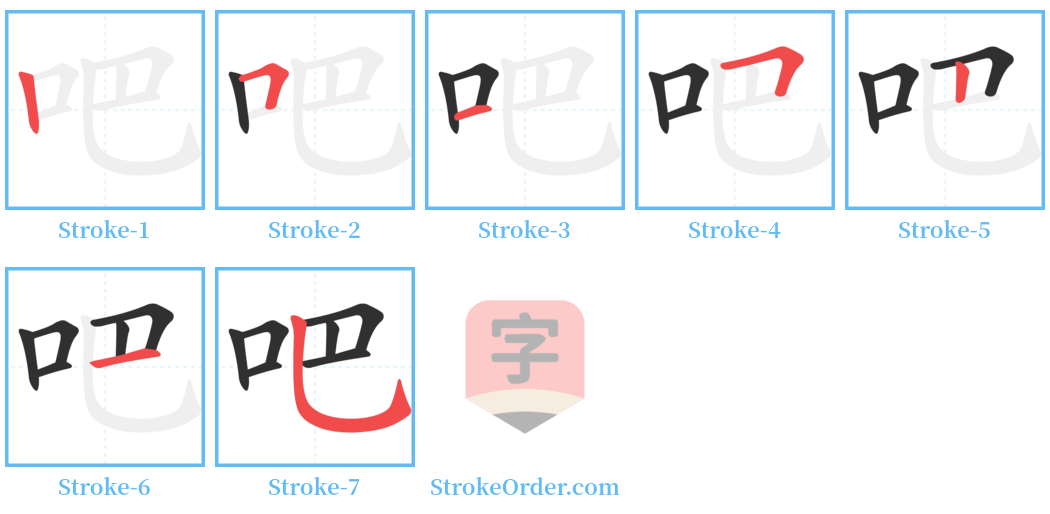吧 Stroke Order
Animated Stroke Order of 吧

Stroke Order Diagrams for 吧

Step-by-Step Handwriting Guide for 吧

Learn to Write Chinese Characters with Video Tutorials
Watch the video of writing the Chinese character "吧", learn the correct stroke order (笔顺) of the character "吧", and master the standard way of writing the character "吧".
Free Printable Handwriting Practice with Stroke Order: 吧
Printable Writing Practice Worksheet of "吧" in Portrait Orientation (Tian Zi Ge)

Printable Writing Practice Worksheet of "吧" in Landscape Orientation (Tian Zi Ge)

Information of 吧
Pinyin
bā、 ba
Radical
口
Strokes
7 strokes
Usage
★★★★★
Definition
(onomat.) / dumb, (modal particle indicating polite suggestion) / ...right? / ...OK?
吧 [bā]
象声词
1. An onomatopoeic word representing a sound, often resembling a loud bang or impact.
Example: "吧吧" two gunshots; "吧" a sound, the string broke; "吧吧" (the sound of lips parting, describing loud talking); "吧唧"; "吧嗒"; "吧喳"; "吧哒".
动词
1. (Dialect) To draw on (smoke) (English: draw on/pull at one's pipe).
Example: He was just drawing on his assorted tobacco.
名词
1. A transliteration of the English word "bar", referring to a small tavern, also known as a bar.
2. See also: ba.
助词
1. Used at the end of a sentence, indicating a tone of entreaty, suggestion, command, etc.
Example: "派六个人不够吧,我的意见派十个人" (Sending six people isn't enough, I suggest sending ten).
"你说给大家听听吧!" (You should share it with everyone!)
2. Used at the end of a sentence, indicating agreement or acknowledgment.
Example: "好吧,我一定去" (Alright, I will definitely go).
"就这样执行吧" (Let's carry it out like this).
3. Used at the end of a sentence, indicating a questioning tone, suggesting doubt.
Example: "他现在赞同了吧?" (He agrees now, right?).
"你弄通了吧?" (You understood it, didn't you?).
4. Used at the end of a sentence, indicating a tone of estimation or speculation.
Example: "他自己总该知道吧" (He should know himself, right?).
"老王会到这边来吧" (Old Wang should come over, right?).
5. Used in the middle of a sentence, indicating a pause, with a hypothetical tone, and having a listing nature.
Example: "说吧,不好;不说吧,也不好" (To say it is bad; not saying it is also bad).
6. See also: bā.
助词
Used at the end of a sentence: indicates negotiation, request, and other tones.
Examples:
- "给我吧!" (Give it to me!): indicates an imperative.
- "快走吧!" (Hurry and leave!): indicates agreement.
- "好吧!" (Okay!): indicates agreement.
- "明天该不会下雨吧?" (It probably won't rain tomorrow, will it?): indicates speculation.
- "算了吧!" (Forget it!): indicates an exclamation.
助词
Used in the middle of a sentence, indicating a pause. It is only used in contrastive sentence structures, expressing indecision or dilemma.
Example: "做吧,没有工夫;不做吧,又急着要用。" (Doing it is problematic, but not doing it is also urgent).
Input Method for 吧
Pinyin
ba1
Wubi
kcn
Cangjie
rau
Zhengma
jyia
Four Corner
67017
Unicode
U+5427
Same Pronunciation Characters